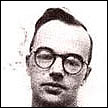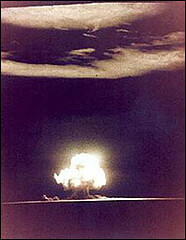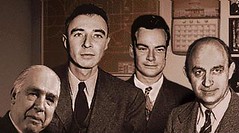Atomic Spy
The Manhattan Project is what brought the world into nuclear age. July 15th 1945 when the first Atomic Bomb was tested, was a bitter sweet moment for the science community. They had unleashed the power of an Atom. The possibilities were limitless. But how it was intended to be used and the further possibilities of creating even more powerful and deadlier weapons of destruction was the cause of concern. Robert J Oppenheimer, the Scientific Director of Manhattan Project, said in a sober voice just after the Test, "I have become Death; the destroyer of worlds."
The subsequent decision to use Nuclear weapons on Hiroshima and Nagasaki and the consequences there-of are one of the most horrific incidences of our history. The ethics behind the usage of Atom Bombs have been debated and documented over the years. An off-shoot of Manhattan Project was the Nuclear race which fueled the Cold war. Therein lies the story of a spy, a spy like no other spy. KLAUS FUCHS.
 Emil Julius Klaus Fuchs, born on December 29, 1911 in Germany, was an enigma. Son of a Lutheran priest, was brilliant in his studies right from childhood. He joined the German Socialist Party in his college days. In 1933 when Hitler's Nazi party came to power, Fuchs felt threatened and escaped to Paris. Sometime later he moved to Britain where he completed his Doctorate from the University of Bristol. He had developed into a brilliant physicist, but when Germany invaded France, all Germans in England were interned and sent to various prison camps. Fuchs was sent to Quebec Canada. Fuchs was able to survive this internship by reading the scientific papers of Heisenberg, Einstein and Bohr and smoking incesstantly on the cigarettes provided by his canadian captors. As suddenly as he was captured in 1940, his release was equally sudden in 1942. He was sent back to England where he was recruited by the University of Birmingham to carry out Atomic research.
Emil Julius Klaus Fuchs, born on December 29, 1911 in Germany, was an enigma. Son of a Lutheran priest, was brilliant in his studies right from childhood. He joined the German Socialist Party in his college days. In 1933 when Hitler's Nazi party came to power, Fuchs felt threatened and escaped to Paris. Sometime later he moved to Britain where he completed his Doctorate from the University of Bristol. He had developed into a brilliant physicist, but when Germany invaded France, all Germans in England were interned and sent to various prison camps. Fuchs was sent to Quebec Canada. Fuchs was able to survive this internship by reading the scientific papers of Heisenberg, Einstein and Bohr and smoking incesstantly on the cigarettes provided by his canadian captors. As suddenly as he was captured in 1940, his release was equally sudden in 1942. He was sent back to England where he was recruited by the University of Birmingham to carry out Atomic research.
Life was good in Birmingham. He was with friends. He returned to work on Theoretical Physics on a project which was named as "Tube Alloys". Though Fuchs was happy with his work and the people he worked with, one thing disturbed him. He could not digest the fact that the British, Americans and the Canadians shared information on the development of this new weapon but excluded its other ally the Soviet Union. He saw Communism as the salvation and the answer to all problems. Disturbed by this and with his inner pro-communist belief, he walked into the Russain Embassy offering to be a spy for the Soviet Union. The Soviets were more than happy to have him on board. He was told that he would be contacted soon. Klaus Fuchs' career as a spy had begun.
Klaus' first Soviet contact was an agent named Ursula who was referred to as the "Girl from Barnbury". In mid 1942 Klaus started meeting Ursula on a regualar basis. These meetings were in true espionage style, in bars or pubs for few minutes at the most. Klaus started passing information about his work, which was restricted information, at "Tube Alloys" to Ursula. In due course of time his contribution to the project started increasing and becoming more sensitive in nature. Also if Klaus had to make more contribution to the project he would have to have access to the classified materials. For this Klaus needed to be a British Citizen. Even though Klaus' stint with German Communist Party was known to everybody, nobody suspected him to be an active Communist. Hence Michael Perrin, the project director of Tube Alloys sponsored for citizenship for Klaus Fuchs. Thus Fuchs who was an active spy for the USSR was granted British Citizenship and was given access to all classified information.
The cooperation between American and British scientist over the Atom Bomb was on rise and it was in 1944 that British scientists were invited to USA to work on the Manhattan Project. Micheal Perrin, recognizing the intelligence and the contribution he could make to the project not only invited Klaus, but also vouched for his integrity. It was here that Klaus established contact with the famous courier Harry Gold aka Raymond. Years later when Klaus' treachery was discovered, Harry Gold's role in the entire spy ring and his importance astounded the Americans. Klaus never had a very good working relationship with Raymond. He considered Raymond to be intellectually inferior and could not comfortably converse with him. But the information that Klaus passed on to Raymond was invaluable. As unlike with Ursula, where Klaus used to pass on information only about the work that he was doing, with Raymond Klaus provided specific information about building of the Atom bomb, the process of obtaining Uranium 235 and ultimately Plutonium from Uranium 238. This was invaluable information for the Soviets as they had huge quantities of U-238 but had no idea how to obtain U-235 from it.
 There was a gap in their meetings as Fuchs and other scientists shifted to Los Alamos where the real work was going on. They were working on two types of bombs. The "Little Boy" which used Uranium - 235 , was dropped on Hiroshima and "Fat Man" which used Plutonium, was dropped on Nagasaki. A third bomb known as the "Gadget" was to be used for testing. It was here that Edward Teller proposed the idea of the Hydrogen Bomb referred as "The Super" at that time. Klaus thought the idea of "The Super" to be remote and far fetched. After the successful test of the Gadget, Scientists were slowly sent back. Klaus was also in the process of winding up his work and looking forward to go back to England. But before he went back, he had one very important job to finish. He had to meet Raymond!
There was a gap in their meetings as Fuchs and other scientists shifted to Los Alamos where the real work was going on. They were working on two types of bombs. The "Little Boy" which used Uranium - 235 , was dropped on Hiroshima and "Fat Man" which used Plutonium, was dropped on Nagasaki. A third bomb known as the "Gadget" was to be used for testing. It was here that Edward Teller proposed the idea of the Hydrogen Bomb referred as "The Super" at that time. Klaus thought the idea of "The Super" to be remote and far fetched. After the successful test of the Gadget, Scientists were slowly sent back. Klaus was also in the process of winding up his work and looking forward to go back to England. But before he went back, he had one very important job to finish. He had to meet Raymond!
He met Raymond for the last time on a bridge in Santa Fe. The information that he passed on here is believed to be the entire plans to build the "Fat Man" with his comments as to how certain processes could be done in a better way. On his return to England, Micheal Perrin started to build Los Alamos type of Laboratory at a place called Harwell so that the Nuclear Research could be carried forward. Klaus was made the Assistant Director of the project. The next three years went smoothly for Klaus. He still provided information to the Soviets, but this information was of not much importance. He slowly reduced his contacts with the Soviets and they in turn were no more interested in having Klaus in their ring of spies.
As early as in 1944 the Americans had intercepted coded messages sent by the Russian Embassy. But they were unable to decode these messages. It was only in 1949 that they were able to decode the messages. The result astounded everybody. The messages mentioned several damaging contents. They also mentioned a British Nuclear Scientist who was supplying information to the Soviets. The Americans immediatley alerted the MI6 about this and they in turn started observing Klaus. It was at this time that Klaus feeling somewhat disturbed, met William Skardon of MI5. Skardon was sure that Klaus was the British Nuclear Scientist mentioned in the intercepts made by the Americans. Skardon played pressure games with Klaus over several meetings threatening and coaxing him into admitting his guilt. It was in one such meeting in January 1950 that Klaus Fuchs admitted that he had been spying for the Soviets since 1942. He signed a confession acceptiong his guilt. Klaus Fuchs was brought on trial on 1st March 1950. His trial lasted for less than two hours. Klaus assumed that the punishment for his guilt would be death. But the British laws allowed only life-imprisonment as the maximum punishment. Klaus was sentenced to 14 years in prison.
Despite being sentenced to 14 years, Klaus was released in June 1959 for good behaviour. Within two days he left Britain for East Germany. Two days later, he became a citizen of the East German Republic. A month later, he was made assistant director of the Institute for Nuclear Physics near Dresden. Ten days later, he married an old friend from his Paris days, Greta Keilson. He settled into a quiet life of science and domesticity. He was honoured by the East German Republic. He was decorated with the Order of Karl Marx in 1979. Klaus Fuchs died in January 1988 at the age of 76 years.
The importance of the information passed by Klaus to the Soviets has been widely debated. Some feel that the information was not of much importance as the Soviets already had advanced knowledge on Nuclear Physics. Others believe that Klaus' information advanced Soviets achieving Nuclear Capability by atleast two years if not more. Still others believe that the information was invaluable for the Soviets without which their Nuclear Project was doomed. Though appaled by the effects of the Hiroshima and Nagasaki bombs, Klaus believed that by passing the information, he had helped achieve a balance in the world. In doing so he ensured that never again would mankind use a Nuclear Weapon again...
 The biggest irony of Manhattan Project is that some of the greatest physicts of our era be it Eienstien, Feynmaan, Niels Bhor etc. were all involved in creating of a weapon which led to the most horrific and destructive action - The bombings of Hiroshima and Nagasaki!
The biggest irony of Manhattan Project is that some of the greatest physicts of our era be it Eienstien, Feynmaan, Niels Bhor etc. were all involved in creating of a weapon which led to the most horrific and destructive action - The bombings of Hiroshima and Nagasaki!
Until next week .... Cherio


2 Comments:
Good piece of information.
"Quality Information" as they used to call.
Keep it going Saurabh
U never give up on irritating ppl,m saurabh
Post a Comment
<< Home